
EXPERIMENTAL AND APPLIED ACAROLOGY
Scope & Guideline
Pioneering Insights into Ecology and Insect Science
Introduction
Aims and Scopes
- Ecology and Behavior of Acari:
Research exploring the ecological interactions of mites and ticks within their environments, including their roles as predators, prey, and pathogens. This encompasses behavioral studies that investigate responses to environmental factors and interspecies interactions. - Molecular and Genetic Studies:
Utilization of molecular techniques to study the genetic diversity, phylogenetics, and population dynamics of various mite and tick species. This includes the examination of symbiotic relationships and the identification of pathogens carried by these organisms. - Pest Management and Biological Control:
Applied research focused on controlling pest species, particularly in agricultural settings. This includes studies on the efficacy of biological control agents, chemical acaricides, and integrated pest management strategies involving mites and ticks. - Pathogen Interactions and Tick-Borne Diseases:
Investigation of the relationships between ticks and the pathogens they transmit, including studies on vector competence, disease dynamics, and the impact of environmental factors on tick-borne disease epidemiology. - Acaricide Resistance:
Research addressing the emergence of resistance in mite and tick populations against various acaricides. This includes studies on the mechanisms of resistance and the development of sustainable management strategies. - Host-Mite Interactions:
Exploration of the interactions between mites and their hosts, including the impacts of infestations on host health and productivity, as well as the behavioral adaptations of mites to exploit their hosts.
Trending and Emerging
- Molecular Techniques and Genomics:
An increasing trend in the use of molecular techniques, such as DNA barcoding and transcriptomics, to investigate the genetics and evolutionary biology of mites and ticks. This trend highlights the importance of genetic analysis in understanding biodiversity and resistance mechanisms. - Environmental Change and Its Impact on Acari:
Research exploring how climate change and other environmental factors affect mite and tick populations, their life cycles, and their interactions with hosts and pathogens. This area is gaining traction as the implications of climate change become more pronounced. - Integrated Pest Management (IPM) Strategies:
A growing emphasis on developing sustainable IPM strategies that incorporate biological control, cultural practices, and ecological considerations. This reflects a shift towards more holistic approaches to pest management in agricultural systems. - Pathogen Discovery and Tick-Borne Diseases:
There is a rising focus on the discovery of new pathogens associated with ticks and the implications for public health and veterinary medicine. This includes studies on emerging zoonotic diseases and the dynamics of pathogen transmission. - Use of Technology in Acarology Research:
The application of advanced technologies such as machine learning and imaging techniques in acarology research is on the rise. These technologies facilitate more detailed analyses of mite and tick behavior, population dynamics, and pest management efficacy.
Declining or Waning
- Traditional Taxonomy and Morphology:
Research focused primarily on the morphological classification of mites and ticks has seen a decline. As molecular techniques become more accessible and prevalent, studies that rely solely on traditional taxonomic methods are being overshadowed. - Generalized Acaricide Studies:
While the studies on acaricides remain relevant, there has been a noticeable decline in research solely focused on the efficacy of chemical treatments without considering integrated approaches or the ecological impacts of these chemicals. - Host Specificity Studies:
Research dedicated to understanding the host specificity of certain mite species has decreased, possibly as researchers focus more on ecological interactions and broader pest management strategies. - Laboratory-Based Behavioral Studies:
Research that examines mite behavior in controlled laboratory settings, without ecological context, has waned in favor of studies that explore behavior in natural environments or under field conditions.
Similar Journals
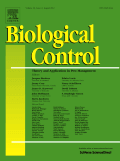
BIOLOGICAL CONTROL
Innovating Biological Strategies for Ecological BalanceBIOLOGICAL CONTROL, published by Academic Press Inc Elsevier Science, is a prestigious journal focusing on the advancement of knowledge in the field of biological pest control and integrated pest management. With a high-impact factor reflecting its significant contributions to agronomy and insect science, it has secured elite positions in both Q1 categories as of 2023. The journal ranks within the top 6% and 12% of its fields on Scopus, making it an essential resource for researchers and professionals dedicated to sustainable agricultural practices and ecological balance. With its comprehensive exploration of theoretical and applied studies from 1991 to 2024, BIOLOGICAL CONTROL serves as a critical platform for disseminating innovative research and promoting dialogue among scholars, students, and practitioners. Although the journal follows a subscription-based access model, it consistently attracts contributions that shape the future of pest management strategies.
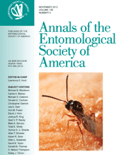
ANNALS OF THE ENTOMOLOGICAL SOCIETY OF AMERICA
Transforming Entomological Research Since 1938ANNALS OF THE ENTOMOLOGICAL SOCIETY OF AMERICA is a premier journal dedicated to advancing the field of insect science, published by Oxford University Press. With an impressive impact factor and classified in the Q1 quartile for its category, this journal ranks among the top publications in agricultural and biological sciences, specifically within insect science, positioned at #28 out of 181, indicating its significant influence and high-quality research contributions. The journal aims to disseminate original research, comprehensive reviews, and groundbreaking findings that enhance our understanding of entomology, spanning across ecological, evolutionary, and applied segments. With a consistent publication history since 1938, researchers, professionals, and students will benefit from the wealth of knowledge presented in its pages. Although the journal does not currently offer open access, it remains a vital resource for those seeking to stay at the forefront of entomological research and innovation.
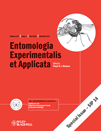
ENTOMOLOGIA EXPERIMENTALIS ET APPLICATA
Pioneering research for a deeper understanding of insects.ENTOMOLOGIA EXPERIMENTALIS ET APPLICATA is a premier journal dedicated to advancing the understanding of insect science through innovative research and thorough experimental methodologies. Published by Wiley, this esteemed journal has been at the forefront of entomology since its inception in 1958, with its latest convergence extending until 2024. With a commendable Impact Factor and categorically positioned in the Q2 quartile across both Ecology, Evolution, Behavior and Systematics and Insect Science fields, it plays a pivotal role in the dissemination of critical findings. The journal is indexed in Scopus, ranking 43rd out of 181 in Insect Science, showcasing its relevance and stature within the academic community, while maintaining a robust visibility among scholars. Given its rigorous peer-review process and a commitment to quality and innovation, ENTOMOLOGIA EXPERIMENTALIS ET APPLICATA serves as a vital resource for researchers, professionals, and students aiming to deepen their insights into entomological research.

Persian Journal of Acarology
Fostering global collaboration in acarological research.The Persian Journal of Acarology, published by the Acariology Society of Iran, stands as a pivotal resource in the fields of Animal Science, Zoology, and Insect Science. Established in 2012 as an open-access platform, this journal provides researchers and academics with a rich repository of peer-reviewed articles focused on the study of acarology, encompassing both basic and applied research. With its current ranking in the Q3 category and significant Scopus rankings in related fields, the journal fosters scholarly communication among professionals, facilitating the advancement of acarology globally. The journal’s commitment to open access ensures that valuable research is available to a wide audience, supporting both emerging and established scientists in their pursuit of knowledge. With contributions from distinguished authors and a steady trajectory of growth, the Persian Journal of Acarology is a vital tool for those invested in the future of acarological studies and applied entomology.
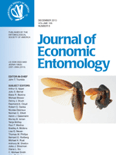
JOURNAL OF ECONOMIC ENTOMOLOGY
Pioneering Research for Sustainable Pest ManagementJOURNAL OF ECONOMIC ENTOMOLOGY, published by OXFORD UNIV PRESS INC, stands as a premier interdisciplinary platform for researchers and professionals in the realms of entomology and ecological sciences. With a robust publication history dating back to 1945, this esteemed journal has consistently maintained its reputation for disseminating high-quality research, as evidenced by its prestigious Q1 rankings in both Ecology and Insect Science for 2023. The journal’s impact is highlighted by its excellent Scopus ranks, placing it in the top percentile of Agricultural and Biological Sciences and Environmental Science categories. Aimed at advancing the understanding of insects and their relationships with humans and ecosystems, the JOURNAL OF ECONOMIC ENTOMOLOGY offers a critical forum for original research articles, reviews, and opinion pieces that influence practices in pest management, conservation, and agricultural productivity. Although not an Open Access journal, its findings are pivotal for students, researchers, and professionals striving to address contemporary challenges in entomology and beyond.

Frontiers in Insect Science
Unleashing Knowledge for Sustainable Insect ManagementFrontiers in Insect Science is a pioneering open-access journal dedicated to the advancement of knowledge in the field of insect science. Published by FRONTIERS MEDIA SA in Switzerland, this journal serves as a vital platform for researchers, professionals, and students to disseminate high-quality, peer-reviewed research spanning diverse topics within insect biology, ecology, and pest management. Since its establishment in 2021, the journal has gained recognition, ranking in the Q2 category of Insect Science with a Scopus ranking of #92 out of 181 in the field. With a commitment to promoting open access and collaboration, Frontiers in Insect Science is instrumental in fostering innovative research and practical applications essential for combating biodiversity loss and enhancing agricultural sustainability. As a freely accessible resource, it invites contributions that impact both fundamental and applied insect research, connecting a global network of scholars eager to explore the fascinating world of insects.
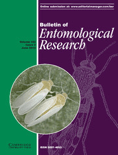
BULLETIN OF ENTOMOLOGICAL RESEARCH
Exploring the Intersections of Insects and InnovationBULLETIN OF ENTOMOLOGICAL RESEARCH, published by Cambridge University Press, is a prestigious journal that has been at the forefront of entomological research since its inception in 1910. With an impressive track record extending through to 2024, this journal serves as a vital platform for advancing knowledge in various related fields, notably Agronomy and Crop Science and Insect Science, where it ranks in the top quartile (Q2) and maintains a commendable position within the Scopus rankings in its categories. Notably, its contributions also intersect with Medicine in a broader scope, fostering interdisciplinary insights. While access to the journal content is not classified as 'Open Access,' its rigorous peer-reviewed articles are crucial for researchers, professionals, and students seeking to enhance their understanding of entomology and its applications in agronomy and beyond. The journal's impact is reflected in its notable percentile rankings, emphasizing its relevance and influence in the academic community. Located at the heart of the UK, the BULLETIN OF ENTOMOLOGICAL RESEARCH continues to be an essential resource for those dedicated to the study and understanding of insects and their impacts on agriculture and health.

BULLETIN OF INSECTOLOGY
Illuminating the Path of Insect ScienceBULLETIN OF INSECTOLOGY is a prominent academic journal published by ALMA MATER STUDIORUM, UNIV BOLOGNA, Italy, specializing in the field of Insect Science. The journal, with ISSN 1721-8861 and E-ISSN 2283-0332, has established itself as a vital resource for researchers and professionals interested in the diverse aspects of entomology and its applications. It ranks in the Q2 category for Insect Science as of 2023, placing it among the top journals in its field with a Scopus rank of 79 out of 181. The BULLETIN OF INSECTOLOGY is committed to disseminating high-quality research and innovative studies, facilitating open dialogue and collaboration among scientists. As an essential platform for sharing groundbreaking findings, it contributes significantly to the body of knowledge in agricultural and biological sciences, making it an invaluable asset for scholars and practitioners alike. With coverage from 2002 to 2024, this journal continues to foster advancements in entomological research and its importance in tackling environmental challenges.
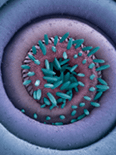
Annual Review of Entomology
Pioneering Insights in Ecology and EvolutionAnnual Review of Entomology, published by Annual Reviews, is a premier journal dedicated to advancing the understanding of entomology through comprehensive review articles from leaders in the field. With a focus on Ecology, Evolution, Behavior, and Systematics and Insect Science, the journal ranks in the top quartile (Q1) as of 2023, reflecting its significant impact and relevance in these disciplines. Based in the United States, the Annual Review of Entomology has been a trusted resource since its inception, providing critical insights that inform research, policy, and education in entomology. Researchers and professionals will find valuable reviews that synthesize current knowledge and highlight future directions in insect research. The journal's impressive standing, as indicated by its rankings—first in both Agricultural and Biological Sciences categories—emphasizes its pivotal role in shaping scientific discourse and innovation.
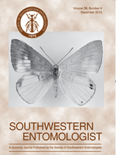
SOUTHWESTERN ENTOMOLOGIST
Innovating Solutions through Entomological ResearchSOUTHWESTERN ENTOMOLOGIST is a pivotal academic journal dedicated to advancing the fields of Agronomy, Ecology, and Insect Science. Published by the SOUTHWESTERN ENTOMOLOGICAL SOC in the United States, this journal plays a crucial role in disseminating vital research findings that address pressing ecological and agricultural challenges. With its ISSN 0147-1724 and E-ISSN 2162-2647, the journal has been publishing comprehensive studies since 1993 and continues to contribute significantly to the knowledge base up to 2024. As a Q4 ranked journal in both Agronomy and Crop Science and Ecology, as well as Insect Science, it provides an inclusive platform for researchers and students to share their insights and foster collaborations. Although it currently does not offer open access options, the content is accessible to academic institutions and professionals, ensuring that significant findings reach a broad audience. Given its niche focus, SOUTHWESTERN ENTOMOLOGIST not only appeals to researchers and students but also to professionals looking to stay updated on the latest trends and developments in entomology and its related fields.